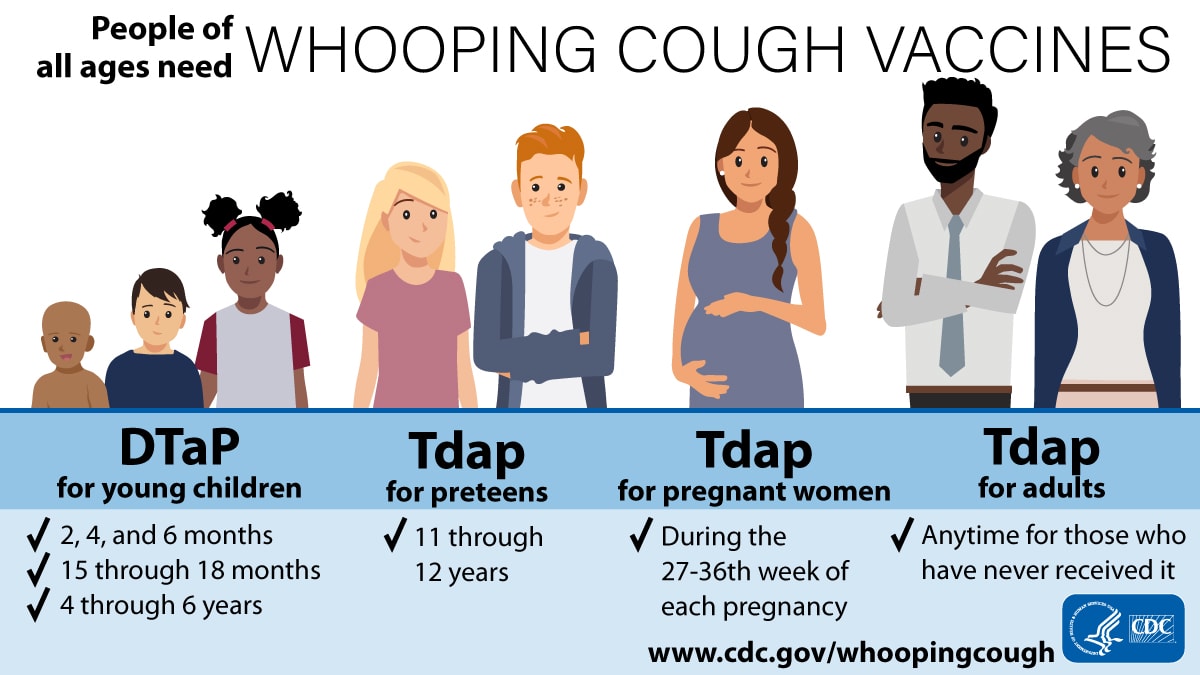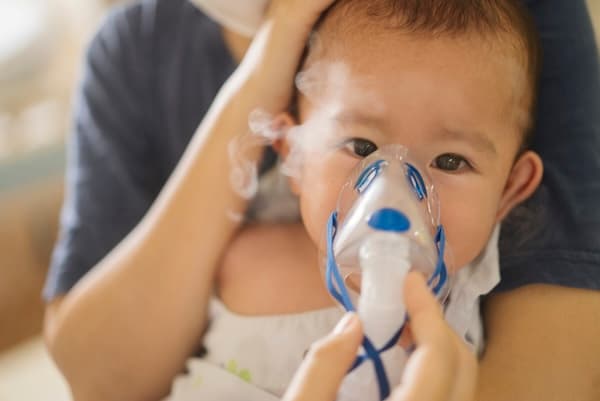[6 MIN READ]
In this article:
-
Whooping cough has been experiencing a resurgence as vaccination rates have lowered and people have been less likely to stay home when they’re sick.
-
It can go away on its own, but it’s best to take an antibiotic so you are less likely to infect others.
-
The best way to protect against complications is to get the whooping cough vaccine. The typical vaccination schedule starts at the age of 2 months and includes five doses.
Whooping cough (pertussis): Everything you need to know
Like several other respiratory illnesses, cases of whooping cough (also called pertussis) decreased dramatically during the COVID-19 pandemic. People were vigilant about staying home when they were sick and keeping their germs to themselves.
However, a drop in vaccination rates has meant that whooping cough is becoming a problem again. Sahar Raheel, M.D., a Providence pediatrician who treats patients in Los Angeles, California, explains more about the infection and how to avoid it.
What is whooping cough?
Whooping cough is a highly contagious respiratory infection that is known for its distinctive cough.
“When someone has whooping cough,” says Dr. Raheel, “they may have severe, rapid coughing fits that can be worse at night. After the coughing fits, they may make a high-pitched whooping sound when inhaling.”
There are three different stages of the disease:
- In the first one to two weeks (known as the catarrhal stage), a person may have mild cold symptoms (such as a runny nose, mild cough and sneezing) that make the infection difficult to differentiate from a common cold.
- In the next one to six weeks (known as the paroxysmal stage), a person may have the severe coughing fits with the classic “whoop” sound.
- In the weeks to months after acquiring the disease (known as the convalescent stage), the person’s cough slowly improves.
Recognizing whooping cough symptoms
It usually takes between five and 10 days after exposure for you to first experience symptoms. As noted above, the first symptoms of whooping cough are:
- Runny or stuffed-up nose
- Mild coughing
- Low-grade fever
However, babies with whooping cough may not cough at all. Instead, they might experience periods of apnea, which are dangerous pauses in breathing.
After the first week or two of infection, you may experience violent coughing spells as well as:
- Difficulty sleeping at night
- Struggling to breathe
- Vomiting before or after coughing
- Feeling tired after fits
- Breaking a rib as a result of the fit
How does whooping cough spread?
Whooping cough spreads when droplets of bacteria move through the air after an infected person sneezes, coughs or even talks.
A person who has whooping cough is contagious from the onset of their cold-like symptoms until two to three weeks after coughing first begins. However, if they start taking antibiotics, that contagious period can be shortened to five days.
Babies under 1 year old are by far most at risk for severe whooping cough, according to the CDC. Others who are at risk include pregnant people, those with chronic respiratory conditions, people with weakened immune systems and those over the age of 65.
Getting diagnosed: How doctors identify whooping cough
“Whooping cough can be difficult to diagnose because the signs and symptoms are like other respiratory illnesses,” says Dr. Raheel.
Providers can order laboratory testing to look for the Bordetella pertussis bacteria. But often, all they need is to take the patient’s history and perform a physical exam. Rather than waiting for the results of a lab test, they can then start treatment to prevent the infection’s spread.
Treatment options for whooping cough
Whooping cough can go away on its own without treatment in healthy adolescents and adults, but it’s a better idea for a provider to prescribe antibiotics, says Dr. Raheel. “This is so they can limit severity of the disease and transmission of the disease to more vulnerable populations, such as infants and other high-risk groups. Antibiotics should also be given to all household members and individuals in close contact, regardless of vaccination status.”
If you don’t receive treatment, you still may experience a lingering cough for weeks to months and are at a higher risk for complications.
Serious complications to watch for
Whooping cough can lead to serious complications — particularly in babies and young children. In fact, about one in three babies younger than 1 need to be hospitalized after contracting whooping cough.
Some of the complications in babies include:
- Apnea
- Pneumonia
- Convulsions
- Encephalopathy (disease of the brain)
The main complication of whooping cough in teens and adults is pneumonia — although vaccination has proven to be a big protection against complications.
Prevention through vaccination
The single best way to protect yourself and your children from the complications of whooping cough is to get vaccinated.
The CDC’s recommended DTaP (diphtheria, tetanus and pertussis) vaccine schedule for children includes five doses: one at 2, 4 and 6 months, then again at 15 months and once more between the ages of 4 and 6. Doctors also recommend a Tdap booster shot between the ages of 11 and 12, and then boosters every 10 years.
Pregnant women should receive a Tdap booster between the 27th and 36th week of pregnancy.

Can whooping cough come back?
Yes, whooping cough can come back because immunity wanes over time.
“People who have had whooping cough have some immunity against future whooping cough infections,” says Dr. Raheel. “However, getting sick with whooping cough does not provide lifelong protection.”
If you or your child have had whooping cough, the best way to protect yourself is to see your doctor for a vaccine booster shot. Booster shots can give you continuing protection so you don’t get it again.
When to contact Providence
If you believe you or your child have whooping cough, it’s important to call your doctor right away. Providence offers same-day and urgent care appointments for your convenience.
If you don’t have whooping cough but aren’t sure if you are up to date on your vaccinations, your primary care provider can find your vaccine history and help you get caught up.
Whooping cough Q&A
Q: What is whooping cough?
A: Whooping cough is a contagious infection that causes severe coughing fits and a “whoop” sound when breathing in.
Q: What are the symptoms?
A: Whooping cough starts like a cold (runny nose, mild cough, low fever) but can progress to violent coughing, trouble breathing, vomiting, or apnea in babies.
Q: How does it spread?
A: Coughs, sneezes or talking can all spread whooping cough. It’s contagious for weeks unless treated with antibiotics.
Q. How is it treated?
A: Antibiotics help lessen symptoms of whooping cough and prevent spreading, especially to babies and high-risk groups.
Q. How can I prevent it?
A: Stay up to date on DTaP/Tdap vaccines and boosters — they’re the best protection.
Contributing caregiver

Sahar Raheel, M.D., is a Providence pediatrician who treats patients in Los Angeles, California.
Find a doctor
If you are looking for a primary care or urgent care provider, you can find what you are looking for in our provider directory. Through Providence Express Care Virtual, you can access a full range of health care services.
Download the Providence app
It’s all in the app: easily stay connected with Providence and your health. With the Providence app, you can schedule appointments, have virtual visits from the comfort of your home, get personalized health recommendations, access your health records and so much more. Learn more and download the app.
Related resources
Comprehensive guide to winter illness
Understanding measles: What you need to know
Bronchitis: Signs, symptoms and treatments
This information is not intended as a substitute for professional medical care. Always follow your health care professional’s instructions.
About the Author
More Content by Providence Health Team






















